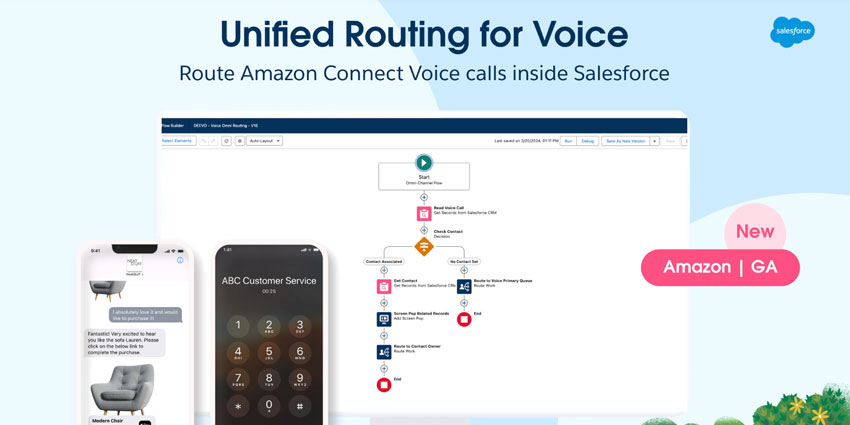If you’re looking for insights into the most impressive Salesforce service cloud features worth accessing today, you’re in the right place. Over the years, Salesforce has earned a reputation for being the world’s top CRM provider. However, the company also excels in offering a wide range of cloud-based tools for sales, marketing, and customer service.
Salesforce Service Cloud is the next-generation all-in-one platform for service-focused employees. It combines CRM technology with workflow automation, artificial intelligence, and telephony. Service Cloud empowers companies to deliver intuitive omnichannel service and support to consumers while unlocking opportunities for higher levels of personalization.
Plus, the platform offers plenty of opportunities for customization, thanks to the Salesforce AppExchange marketplace for integrations.
Here’s your guide to the top features of Salesforce Service Cloud.
The Best Salesforce Service Cloud Features
Like all cloud platforms in the Salesforce portfolio, the Salesforce Service Cloud is constantly evolving, introducing new features to enhance CX and team productivity. We believe these are just some of the top Salesforce Service Cloud features that set the solution apart from the competition.
1. Einstein AI and Generative AI
Technically, the Einstein AI features offered by Salesforce aren’t exclusive to the Service Cloud platform. However, you can still find a lot of valuable service-focused capabilities in the toolkit.
Now infused with generative AI, Einstein for customer service employees can accomplish various tasks. Team members can use the solution to create AI-generated customer replies on any channel, from WhatsApp to SMS. These replies are crafted using conversational data and information from your company’s knowledge base for greater personalization.
Einstein AI can also create work summaries with highlighted action items for employees, draw attention to valuable knowledge base articles, and search for knowledge on your behalf. The system can suggest next-best actions, classify cases automatically, and more. Plus, you can build your own multilingual bot with Einstein to automate routine tasks.
2. Salesforce Service Cloud Features: Case Management
The incredible “case management” console, specially built for service teams, is at the heart of the Salesforce Service Cloud features list. This console allows organizations to provide their team members with a unified workspace where they can access voice tools, collaborate with team members, track case information, and more.
The biggest benefit of the unified console is its easy navigation. Agents get a multi-tab workspace to work on various cases simultaneously without switching screens. Users can customize their layout, rearranging components according to their workflows.
As a bonus, the workspace is naturally integrated with all Salesforce products and can be enhanced with integrations to third-party applications through the Salesforce marketplace.
3. Integrated Slack for Collaboration
Since Salesforce purchased Slack, the company has been embedding the collaboration tool into more of its workflows and offering teams more intuitive ways to work together. Salesforce Service Cloud features Slack already built into the ecosystem, so employees can rapidly track down subject matter experts and resolve issues faster.
You can also create flows in Slack, using automation to quickly send information to colleagues, update tasks, or simply request approvals. Plus, Salesforce offers access to “Swarming reports” and dashboards for supervisors and managers.
This means business leaders can keep an eye on “swam” participation in Slack and find out how collaborative sessions influence the flow of work.
4. Salesforce Service Cloud Features: Knowledge Management
To help enhance employee experience, Salesforce doesn’t just focus on enabling collaboration. It also ensures team members can access all necessary information in a convenient environment. Companies can build their dedicated knowledge base filled with articles and tools for teams.
This cloud-based knowledge base is instantly accessible through the Salesforce Service cloud dashboard. Companies can also choose to make it available to customers, helping them answer questions without the need for human support.
Notably, the Einstein generative AI features now also mean that Salesforce can automatically suggest articles to customers and employees based on machine learning insights.
5. Easy Omnichannel Routing
Exceptional omnichannel experiences are now mandatory in the CX landscape. However, it’s not enough to simply embrace a wide range of platforms. Companies also need to ensure they can offer a consistently convenient experience to users.
Salesforce Service Cloud features a range of communication methods for employees and customers, including integrations with social media messaging tools like WhatsApp and SMS. It also includes various omnichannel routing options for business leaders.
The unified routing solution brings all support channels together to prevent agents from having to jump between apps. AI tools can match cases with the best agents based on availability, workload, and skills. Plus, there are overviews into employee performance available to help supervisors monitor agent capacity and potential burnout.
6. Salesforce Service Cloud Features: Incident Management
Resolving issues quickly and effectively is a must for customer-facing teams. Fortunately, Salesforce Service Cloud features case management and incident management tools to enhance productivity. Companies can leverage customizable case assignment rules, escalations, entitlements, and milestones for their teams.
Plus, built-in incident detection and response components help businesses stay ahead of disruptions. Out-of-the-box integrations on the service cloud help businesses quickly detect problems and then use automation to speed up response times.
You can diagnose and resolve issues quickly by pinpointing impacted assets. Plus, business leaders can proactively notify customers about issues before they reach out. For instance, you can send a broadcast if a specific network isn’t responding.
7. Telephony Integration and Tools
One of the critical things that separates Salesforce Service Cloud from other CRM platforms and collaboration tools is telephony integration. Salesforce’s voice capabilities allow companies to integrate their existing telephony systems.
Plus, they ensure agents can make or receive calls through the console. Users can access basic features like click-to-call to save time during workflows. There are also call management tools for transferring conversations and holding conferences. You can even automatically log calls and call notes within Salesforce records.
One of the most appealing features here is the ability to identify callers instantly and access their profiles for personalized insights into preferences and call histories.
8. Process and Workflow Automation
Automation, alongside AI, is quickly becoming one of the most essential tools in the CX space. As customer journeys grow more complex, businesses rely on automation to enhance workforce efficiency and productivity. Unfortunately, some tools don’t make it easy to automate tasks.
This isn’t the case with Salesforce. The Salesforce Service Cloud features a range of convenient tools for process automation. Without coding knowledge, you can set up workflow rules to automate alerts, updates, and tasks based on specific criteria.
The platform’s process builder makes it simple to visually design and automate anything from sending email notifications to customers to updating records. You can even define and use multi-step approval processes for compliance purposes.
9. Analytics and Data Insights
Gathering valuable insights from customer interactions helps businesses to build more powerful workflows and increase customer retention. However, in today’s omnichannel world, it can be difficult to maintain a unified view of the customer journey.
The Salesforce Service Cloud integrates with the “Data Cloud,” which allows companies to unify their customer and business data across multiple applications. You can leverage out-of-the-box connectors to bridge the gaps between any system. Plus, AI solutions tap into your data cloud to help drive more personalized, relevant interactions.
Additionally, Salesforce offers some of the best CRM analytics on the market, offering features like “Einstein Discovery,” native analytics and dashboards, and even extensive security and user management. You can even leverage real-time segmentation for your customer profiles.
10. Unique Self-Service Solutions
We’ve already mentioned some of the Salesforce Service Cloud features that empower companies to deliver self-service to consumers. However, you can do more than create generative AI bots and knowledgebases with the platform.
Salesforce also allows businesses to build a branded help center with mobile-responsive portals that surface information based on a customer’s journey. You can also use the automation tools in Salesforce to embed any business process across all channels in your customer’s journey.
Salesforce even offers a simple “experience builder” with drag-and-drop functionality and pre-built templates to help companies get started without coding knowledge.
The Best Salesforce Service Cloud Features for CX
When creating incredible, personalized, and omnichannel customer experiences, the Salesforce Service Cloud features various unique tools for companies. With state-of-the-art integrations, intuitive analytics, and even generative AI, you can quickly transform every stage of the customer journey.
What’s more, the intuitive Salesforce Service Cloud toolkit prioritizes ease of use, ensuring every employee can unlock the full benefits of the solution with minimal effort.







